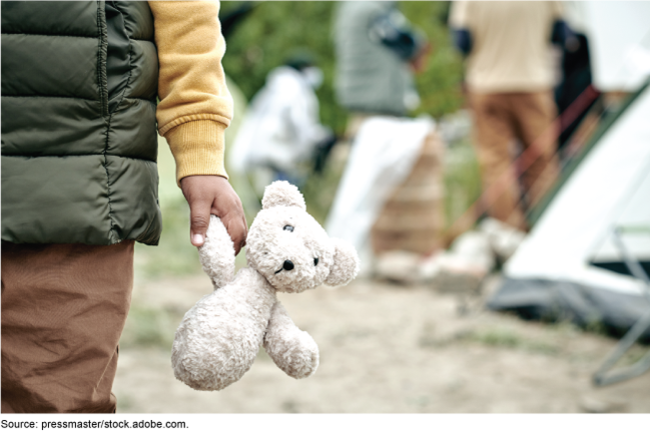Unaccompanied Children: Efforts by the Office of Refugee Resettlement to Address GAO Recommendations
Fast Facts
Each year thousands of migrant children enter the U.S. without a parent or guardian.
We testified on efforts to address 9 of our prior recommendations related to the Office of Refugee Resettlement's role in caring for unaccompanied children. Our recommendations included:
Ensuring care providers are qualified
Overseeing and monitoring care facilities
Tracking services after the children are released to sponsors
The agency fully addressed 5 recommendations and the rest partially. For example, grant announcements now clarify what information care providers must submit on their licensing status and past abuse or neglect allegations.

Highlights
What GAO Found
The Department of Health and Human Services' Office of Refugee Resettlement (ORR) has taken several steps to address prior GAO recommendations related to its role in caring for unaccompanied children—those that enter the United States without a parent or lawful immigration status. ORR awards grants to providers that operate facilities to house and care for unaccompanied children.
In its 2020 report, GAO found that ORR had awarded grants for 219 facilities operating in 25 states. ORR and state licensing agencies each play a role in overseeing facilities and ensuring that they meet health and safety standards, among others. Facilities generally must be licensed to operate in the state.
ORR took steps to sufficiently address five GAO recommendations, while ORR has partially addressed four others. The nine recommendations were related to:
- Ensuring care providers are qualified (three recommendations). GAO's 2020 report found that ORR's grant announcements used to solicit care providers for unaccompanied children were unclear. Specifically, it was unclear what information applicants were to submit on their licensing status and related concerns. This information helps ensure that providers are qualified to care for unaccompanied children. ORR took steps to address two recommendations that staff verify applicants' licensing and performance information. ORR partially addressed a third recommendation by requiring in recent announcements that applicants report any allegations of abuse or neglect or adverse licensing actions. GAO will close this recommendation when ORR clarifies that applicants should report licensing issues at all facilities that they operate.
- Oversight and monitoring of facilities (three recommendations). GAO's 2020 report also found that ORR did not provide clear instructions to grantees on including state licensing citations in their performance reports to ORR, which is needed for effective oversight of ORR facilities. ORR addressed two of GAO's recommendations by collecting information from its grantees on any state licensing citations and notifying grantees and ORR staff that grantees were required to report this information. ORR also addressed a third recommendation to develop plans to help meet its monitoring goals.
- Information sharing (two recommendations). In its 2020 report, GAO also found limited information sharing between ORR and state licensing agencies. ORR has partially addressed the recommendations by establishing communication channels and points of contact in some states. GAO will close the recommendations when ORR completes outreach to all states.
- Tracking post-release services (one recommendation). GAO's 2016 report found that there was limited information available on post-release services that ORR provides. These services include linking families to education and community resources, in-home counseling, and case management. Tracking these services would allow the information to be compiled in summary form and provide useful information to ORR and others. GAO will close this recommendation when ORR completes improvements to its case management system to enable tracking of post-release services.
Why GAO Did This Study
Thousands of children enter the United States without a parent or guardian and without lawful immigration status each year. Many unaccompanied children have been exposed to trauma and violence and travelled great lengths to get to the United States. In addition, unaccompanied children may be at greater risk becoming child trafficking victims.
These children are generally referred to ORR for care by the Department of Homeland Security. ORR is responsible for coordinating and implementing the care and placement of unaccompanied children. In fiscal year 2023, ORR cared for about 119,000 unaccompanied children, according to agency data.
This testimony summarizes findings from GAO's 2016 and 2020 reports on ORR's role in the care and release of unaccompanied children. It provides an update on ORR's efforts to address nine recommendations contained in those reports. The reports identified several significant lapses in ORR's implementation of policies and procedures that could affect the quality of care provided to these children.
GAO's 2016 and 2020 reports contain a detailed description of the methodology used. Generally, GAO reviewed relevant federal laws and regulations and ORR policies and monitoring documentation. GAO also obtained the views of a range of relevant stakeholders such as ORR officials, state licensing agencies, staff at grantee facilities, and others.
For more information, contact Kathryn A. Larin at (202) 512-7215 or larink@gao.gov.
